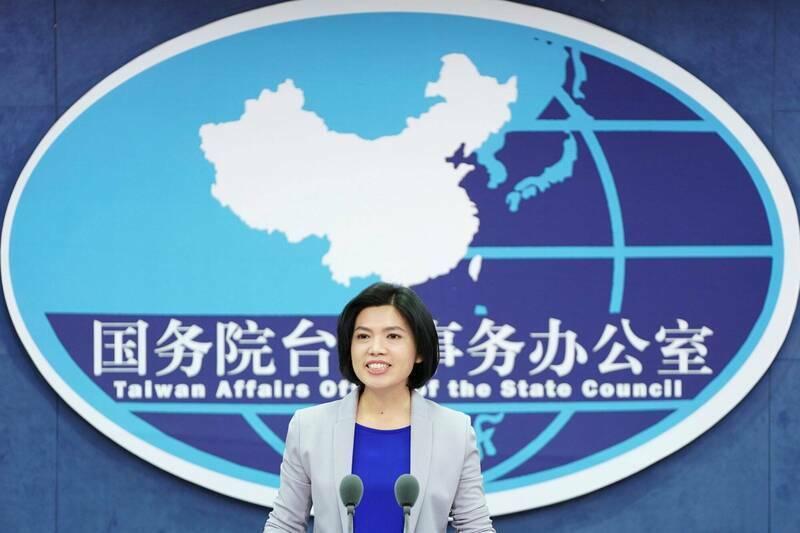China’s Taiwan Affairs Office (TAO) on Wednesday confirmed that Taiwanese writer Liao Meng-yen (廖孟彥) had been arrested in China for producing obscene content, but did not confirm reports that he had been sentenced to 12 years in prison.
The day before, the Straits Exchange Foundation said that the writer known as Roson (羅森) had lost contact with his family for more than a year.
The family contacted the foundation for assistance last week, which at their request vowed to contact China’s Association for Relations Across the Taiwan Strait regarding the case, it said.

Photo: Reuters
Out of respect for Liao’s privacy, the foundation did not release further details in accordance with his family’s wishes.
On Dec. 1, a post on Professional Technology Temple (PTT) claimed that Liao had been sentenced to 12 years in prison, citing a post from a Chinese fan on Nov. 30.
Earlier this year on Feb. 7, the Chinese state-owned Xinhua news agency reported that Chinese police arrested a man surnamed Liao for “propagating obscene messages in the guise of fantasy novels.”
At a regular news conference in Beijing, TAO spokesperson Zhu Fenglian (朱鳳蓮) on Wednesday confirmed that “relevant departments” were handing the case.
Liao is suspected of “producing, selling or disseminating obscene articles for profit,” and is being handled according to the law, Zhu said in China’s first public comments on the matter.
Liao, who has lived in China’s Guangdong Province for many years, is known for writing erotica and wuxia, or "martial hero" fantasies.
The writer’s China-based Web site has been inaccessible since September last year and the most recent post on his Weibo account was in November last year.

CHANGING LANDSCAPE: Many of the part-time programs for educators were no longer needed, as many teachers obtain a graduate degree before joining the workforce, experts said Taiwanese universities this year canceled 86 programs, Ministry of Education data showed, with educators attributing the closures to the nation’s low birthrate as well as shifting trends. Fifty-three of the shuttered programs were part-time postgraduate degree programs, about 62 percent of the total, the most in the past five years, the data showed. National Taiwan Normal University (NTNU) discontinued the most part-time master’s programs, at 16: chemistry, life science, earth science, physics, fine arts, music, special education, health promotion and health education, educational psychology and counseling, education, design, Chinese as a second language, library and information sciences, mechatronics engineering, history, physical education

The Chinese military has boosted its capability to fight at a high tempo using the element of surprise and new technology, the Ministry of National Defense said in the Quadrennial Defense Review (QDR) published on Monday last week. The ministry highlighted Chinese People’s Liberation Army (PLA) developments showing significant changes in Beijing’s strategy for war on Taiwan. The PLA has made significant headway in building capabilities for all-weather, multi-domain intelligence, surveillance, operational control and a joint air-sea blockade against Taiwan’s lines of communication, it said. The PLA has also improved its capabilities in direct amphibious assault operations aimed at seizing strategically important beaches,

‘MALIGN PURPOSE’: Governments around the world conduct espionage operations, but China’s is different, as its ultimate goal is annexation, a think tank head said Taiwan is facing a growing existential threat from its own people spying for China, experts said, as the government seeks to toughen measures to stop Beijing’s infiltration efforts and deter Taiwanese turncoats. While Beijing and Taipei have been spying on each other for years, experts said that espionage posed a bigger threat to Taiwan due to the risk of a Chinese attack. Taiwan’s intelligence agency said China used “diverse channels and tactics” to infiltrate the nation’s military, government agencies and pro-China organizations. The main targets were retired and active members of the military, persuaded by money, blackmail or pro-China ideology to steal

DEADLOCK: As the commission is unable to forum a quorum to review license renewal applications, the channel operators are not at fault and can air past their license date The National Communications Commission (NCC) yesterday said that the Public Television Service (PTS) and 36 other television and radio broadcasters could continue airing, despite the commission’s inability to meet a quorum to review their license renewal applications. The licenses of PTS and the other channels are set to expire between this month and June. The National Communications Commission Organization Act (國家通訊傳播委員會組織法) stipulates that the commission must meet the mandated quorum of four to hold a valid meeting. The seven-member commission currently has only three commissioners. “We have informed the channel operators of the progress we have made in reviewing their license renewal applications, and